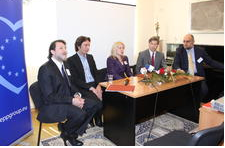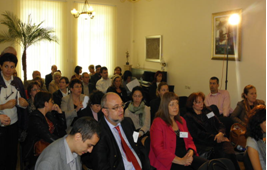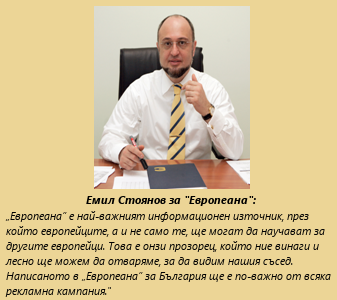Foundation
Pygmalion
Europeana
"Europeana" is a digital library, museum and cultural archive. It is a site that gives access to nearly 15 million digital works - films, photographs, paintings, musical scores, maps, manuscripts, books, periodicals.

The digital content is provided by European museums, libraries, archives and audiovisual collections. Each country decides on its own how to be represented in the European online library. Currently half of the content is from France, where one can see the digitized collections of the Louvre, the first records from the battlefield in France in 1914. Apart from the Louvre also 1,500 institutions more have submitted their content in Europeana, allowing everyone to experience European history and culture from ancient times until today.

During the first conference in 2010

Part of the audience during the second conference
The first international conference "Necessary steps for integration of Bulgaria into the Europeana", organized by Emil Stoyanov, took place in Plovdiv on 23 and 24 April and brought together for the first time in Bulgaria representatives of the European Commission, Foundation Europeana, the Ministry of Culture, the National Assembly and the biggest Bulgarian libraries, the academic and the cultural institutions involved in the project of digitization of the spiritual heritage of Europe.

It was organized by the Member of the European Parliament Emil Stoyanov in Plovdiv on 23 and 24 April and brought together for the first time in Bulgaria representatives of the European Commission, Foundation Europeana, the Ministry of Culture, the National Assembly and the biggest Bulgarian libraries, the academic and the cultural institutions involved in the project of digitization of the spiritual heritage of Europe.
During the second conference entitled "The Bulgarian content in Europeana", which also took place in the Pygmalion House in Plovdiv, the priorities for the Bulgarian content in Europeana were set. To assist this process of digitalization of Bulgarian cultural and historical heritage, the Pygmalion Foundation awarded 10 scholarships for students from Plovdiv University "Paisii Hilendarski", who in the summer of 2011 digitized main cultural and historical sites, through which Plovdiv could be better represented in the project Europeana. They worked in the Special Collections Department of the National Library Ivan Vazov, processing and uploading on electronic media the cultural facts of Plovdiv and the region.
Third Conference on the mega project of the European Union was held in the European Parliament in Brussels. The project Europeana gathered in Brussels, the Bulgarian scientific and political elite with the people from the European institutions, engines of the large-scale project. The conference was initiated by once again by Emil Stoyanov and was aiming to coordinate all Bulgarian efforts to present the Bulgarian cultural and historical heritage in the digital network.
It was attended by leaders of the Committee on Culture from both the European and the Bulgarian Parliament, as well as leading Bulgarian experts from libraries, museums, archives. Special guest was the Bulgarian EU Commissioner Kristalina Georgieva, as well as Jacques de Decker, a member of the Comité des Sages (a high level group for strategic analysis on the digitalization of the European cultural heritage) to the European Commission
In April 2012 in Plovdiv opened the 4th conference devoted on Europeana. The two-day conference attended representatives of libraries, museums, archives and galleries from Bulgaria. Bulgaria has increased more than 9 times its content in the European digital library and has already digitized more than 38,000 titles from Bulgarian literature, music, art, periodicals, announced by Emil Stoyanov. The European Commission has given its recommendations on how to develop Europeana in Bulgaria, said Emil Stoyanov. Henceforth Bulgarians urgently need to create a National Board of digitalization. He will coordinate the work between the different cultural institutions. Minister Tomislav Donchev also expressed his support for this project. Representatives from the Ministry for EU funds read a special letter from the Minister. Emil Stoyanov announced that this year again he will provide 10 scholarships to students from the Plovdiv University, who will continue to work on the digitization of materials and information related to the history of the city and the region.
The participants of the four conferences many times came to the conclusion that Bulgaria still has no national policy and technological infrastructure to allow its merit place in this European venture and therefore urged the authorities to establish a National Council on digitization of cultural and historical heritage, to develop a national strategy for digitization, to build a national register of digital catalogues and to work actively to promote the project. Thus letters to the Minister for Culture and to the Prime Minister have been written; unfortunately an answer is still missing and also any administrative solution of the issue.